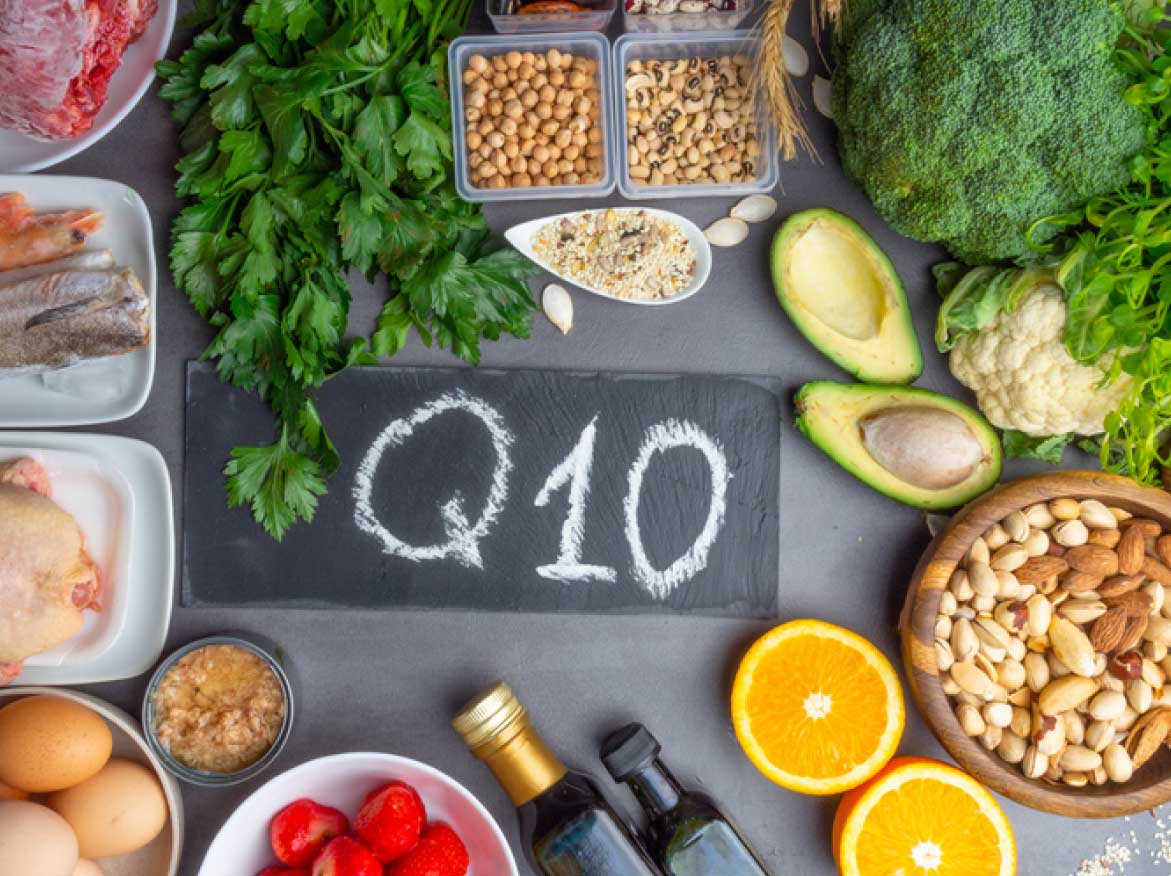We’re all looking for quick fixes to help us fight those extra grey hairs and wrinkles. While we still haven’t found that elusive fountain of youth hidden in some far-off rainforest, we do have one secret weapon that could have the power to keep us looking and feeling young. It’s not magic – it’s an antioxidant known as coenzyme Q10 (CoQ10).
What is coenzyme Q10?
CoQ10 is a powerful antioxidant your body makes. It helps generate loads of energy in your cells, and prevents oxidative damage (a natural byproduct of your cells making energy) and inflammation in every part of your body – especially your largest organ. (Spoiler alert: that’s your skin.)
How does CoQ10 help prevent aging?
While the current body of research is limited, CoQ10 has been shown to have anti-aging properties that help improve skin and hair appearance. In a small 2009 study published in the International Journal of Cosmetic Science, researchers found that a CoQ10-enriched shampoo and tonic helped increase keratins (an important protein that helps keep your hair healthy and strong) when used over a period of 4 days in volunteers over the age of 40. [1]
And it’s not just hair – CoQ10 may also be able to keep your skin looking younger and healthier. In one small study published in BioFactors in 2017, 33 healthy participants had a visible reduction in aging, wrinkles, and fine lines after 12 weeks of daily supplementation of 50 to 150 mg of CoQ10.[2] Another 2015 study of 73 healthy women found that CoQ10 formula applied topically can be absorbed by the skin and helps cells maintain their energy levels. [3]
Emerging research has also found that CoQ10 may be able to help prevent skin damage from the sun. One 2020 study of lab mice found that a sunscreen containing CoQ10 increases the skin’s ability to resist oxidative damage and prevents the breakdown of collagen after UV exposure. [4]
If my body already makes CoQ10, why do I need to worry about it?
While your body does make CoQ10, your levels naturally decrease as you get older – which is a total bummer, seeing as that’s when you need it most. Individuals with health conditions like heart disease, kidney disease, type 2 diabetes, or metabolic syndrome, as well as people taking some medications have also been found to have low CoQ10 levels, according to a review published in the International Journal of Molecular Sciences. [5]

So how can I increase my CoQ10 levels and reap the anti-aging benefits?
Food sources of CoQ10 include omega-3-rich fish like salmon, herring, and sardines, along with beef, pork, chicken, soybeans and broccoli. You can also purchase CoQ10 supplements to boost your daily intake. According to a 2011 article published in the Journal of Pharmacy and BioAllied Sciences, recommended daily doses can range anywhere from 30 to 200 mg per day. [6]
How can I check my CoQ10 levels?
Whether you’ve just discovered CoQ10 or you’ve been supplementing for years, it’s important to regularly monitor your levels to make sure that you’re getting what you need from your body, diet, and supplementation. In addition to routine monitoring, it’s especially important to test your CoQ10 levels if you:
Change supplements
You can supplement your diet with a variety of forms of CoQ10, but not all CoQ10 supplements are created equal. There are two different forms of CoQ10 called ubiquinol and ubiquinone, and your body may struggle to absorb CoQ10 if your capsule is too large or isn’t fat or water soluble. If you switch your CoQ10 supplements, you can get tested and find out if the change affected your levels.
Start taking a new medication
Some medications can potentially lower your CoQ10 levels, so getting tested can help you see if your levels are impacted.
Order an empowerDX at-home CoQ10 test, collect a very small blood sample, mail it to the lab and get secure results in just a few days. Once you’ve got your results, you can make changes and test in a few months to see if those lifestyle changes made a difference. Now that’s beauty from the inside out.
Sources
[1] Giesen, Melanie & Welss, Thomas & Schulze Zur Wiesche, Erik & Scheunemann, V. & Gruedl, S. & Oezkabakcioglu, Y. & Poppe, E. & Petersohn, Dirk. (2009). Coenzyme Q10 has anti-aging effects on human hair. International Journal of Cosmetic Science. 31. 154-155. 10.1111/j.1468-2494.2008.00451_5.x.
[2] Žmitek, Katja et al. “The effect of dietary intake of coenzyme Q10 on skin parameters and condition: Results of a randomised, placebo-controlled, double-blind study.” BioFactors (Oxford, England) vol. 43,1 (2017): 132-140. doi:10.1002/biof.1316
[3] Knott, Anja et al. “Topical treatment with coenzyme Q10-containing formulas improves skin's Q10 level and provides antioxidative effects.” BioFactors (Oxford, England) vol. 41,6 (2015): 383-90. doi:10.1002/biof.1239
[4] Wu, Haiyou, et al. “Coenzyme Q10 Sunscreen Prevents Progression of Ultraviolet-Induced Skin Damage in Mice.” BioMed Research International, vol. 2020, Hindawi, Aug. 2020, doi:10.1155/2020/9039843.
[5] Hargreaves, Iain et al. “Disorders of Human Coenzyme Q10 Metabolism: An Overview.” International journal of molecular sciences vol. 21,18 6695. 13 Sep. 2020, doi:10.3390/ijms21186695
[6] Saini, Rajiv. “Coenzyme Q10: The essential nutrient.” Journal of pharmacy & bioallied sciences vol. 3,3 (2011): 466-7. doi:10.4103/0975-7406.84471


